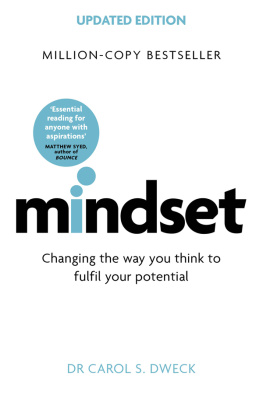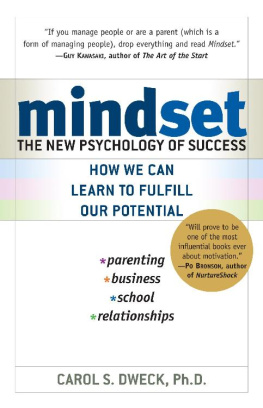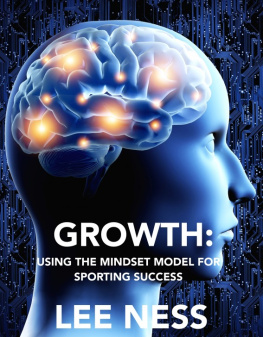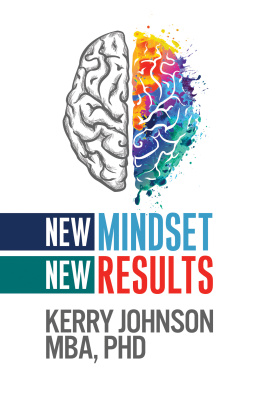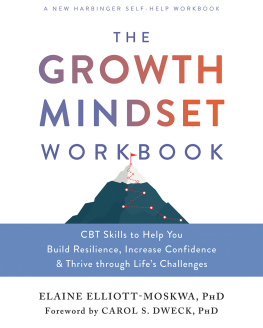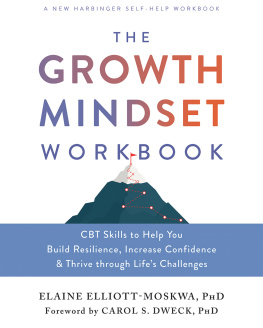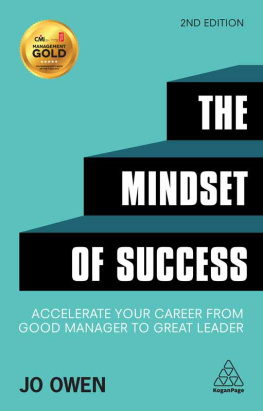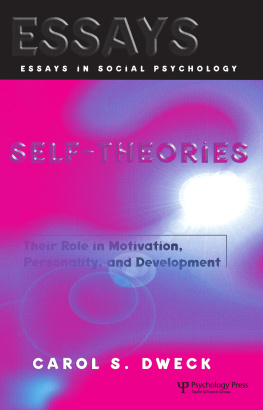Carol Dweck is widely regarded as one of the worlds leading researchers in the fields of personality, social psychology and developmental psychology. She has been the William B. Ransford Professor of Psychology at Columbia University and is now the Lewis and Virginia Eaton Professor of Psychology at Stanford University and a member of the American Academy of Arts and Sciences. Her scholarly book Self-Theories: Their Role in Motivation, Personality and Development was named Book of the Year by the World Education Fellowship. Her work has been featured in such publications as the New Yorker, Time, New York Times, Washington Post and Boston Globe. She lives with her husband in Palo Alto, California.
ROBINSON
First published in the US in 2006 by Random House, an imprint of The Random House Publishing Group, a division of Random House Inc., New York
Published in hardcover in the US by Ballantine, an imprint of The Random House Publishing Group, a division of Random House Inc., New York, 2007
First published in Great Britain in 2012 by Robinson,
an imprint of Constable & Robinson Ltd
This revised edition published in 2017 by Robinson,
an imprint of Constable & Robinson Ltd
Copyright Carol S. Dweck, Ph. D., 2017
The moral right of the author has been asserted.
Grateful acknowledgment is made to Jeremy P. Tarcher, an imprint of Penguin Group (USA), for permission to reprint four illustrations from pp. 1819 of The New Drawing on the Right Side of the Brain Workbook by Betty Edwards, copyright 2003. Reprinted by permission of Jeremy P. Tarcher, an imprint of Penguin Group (USA).
All rights reserved.
No part of this publication may be reproduced, stored in a retrieval system, or transmitted, in any form, or by any means, without the prior permission in writing of the publisher, nor be otherwise circulated in any form of binding or cover other than that in which it is published and without a similar condition including this condition being imposed on the subsequent purchaser.
A CIP catalogue record for this book
is available from the British Library.
ISBN: 978-1-47213-996-2
Robinson
An imprint of
Little, Brown Book Group
Carmelite House
50 Victoria Embankment
London EC4Y 0DZ
An Hachette UK Company
www.hachette.co.uk
www.littlebrown.co.uk
CONTENTS
O ne day, my students sat me down and ordered me to write this book. They wanted people to be able to use our work to make their lives better. It was something Id wanted to do for a long time, but it became my number one priority.
My work is part of a tradition in psychology that shows the power of peoples beliefs. These may be beliefs were aware of or unaware of, but they strongly affect what we want and whether we succeed in getting it. This tradition also shows how changing peoples beliefseven the simplest beliefscan have profound effects.
In this book, youll learn how a simple belief about yourselfa belief we discovered in our researchguides a large part of your life. In fact, it permeates every part of your life. Much of what you think of as your personality actually grows out of this mindset. Much of what may be preventing you from fulfilling your potential grows out of it.
No book has ever explained this mindset and shown people how to make use of it in their lives. Youll suddenly understand the greatsin the sciences and arts, in sports, and in businessand the would-have-beens. Youll understand your mate, your boss, your friends, your kids. Youll see how to unleash your potentialand your childrens.
It is my privilege to share my findings with you. Besides accounts of people from my research, Ive filled each chapter with stories both ripped from the headlines and based on my own life and experience, so you can see the mindsets in action. (In most cases, names and personal information have been changed to preserve anonymity; in some cases, several people have been condensed into one to make a clearer point. A number of the exchanges are re-created from memory, and I have rendered them to the best of my ability.)
At the end of each chapter and throughout the last chapter, I show you ways to apply the lessonsways to recognize the mindset that is guiding your life, to understand how it works, and to change it if you wish.
A little note about grammar. I know it and I love it, but I havent always followed it in this book. I start sentences with ands and buts. I end sentences with prepositions. I use the plural they in contexts that require the singular he or she. Ive done this for informality and immediacy, and I hope that the sticklers will forgive me.
A little note on this updated edition. I felt it was important to add new information to some of the chapters. I added our new study on organizational mindsets to (Changing Mindsets) because many people have asked for more information on how to take that journey. I hope these updates are helpful.
Id like to take this chance to thank all of the people who made my research and this book possible. My students have made my research career a complete joy. I hope theyve learned as much from me as Ive learned from them. Id also like to thank the organizations that supported our research: the William T. Grant Foundation, the National Science Foundation, the Department of Education, the National Institute of Mental Health, the National Institute of Child Health and Human Development, the Spencer Foundation, and the Raikes Foundation.
The people at Random House have been the most encouraging team I could wish for: Webster Younce, Daniel Menaker, Tom Perry, and, most of all, Caroline Sutton and Jennifer Hershey, my editors. Your excitement about my book and your great suggestions have made all the difference. I thank my superb agent, Giles Anderson, as well as Heidi Grant for putting me in touch with him.
Thanks to all the people who gave me input and feedback, but special thanks to Polly Shulman, Richard Dweck, and Maryann Peshkin for their extensive and insightful comments. Finally, I thank my husband, David, for the love and enthusiasm that give my life an extra dimension. His support throughout this project was extraordinary.
My work has been about growth, and it has helped foster my own growth. It is my wish that it will do the same for you.
W hen I was a young researcher, just starting out, something happened that changed my life. I was obsessed with understanding how people cope with failures, and I decided to study it by watching how students grapple with hard problems. So I brought children one at a time to a room in their school, made them comfortable, and then gave them a series of puzzles to solve. The first ones were fairly easy, but the next ones were hard. As the students grunted, perspired, and toiled, I watched their strategies and probed what they were thinking and feeling. I expected differences among children in how they coped with the difficulty, but I saw something I never expected.
Confronted with the hard puzzles, one ten-year-old boy pulled up his chair, rubbed his hands together, smacked his lips, and cried out, I love a challenge! Another, sweating away on these puzzles, looked up with a pleased expression and said with authority, You know, I was hoping this would be informative!
Whats wrong with them? I wondered. I always thought you coped with failure or you didnt cope with failure. I never thought anyone loved failure. Were these alien children or were they on to something?
Next page
